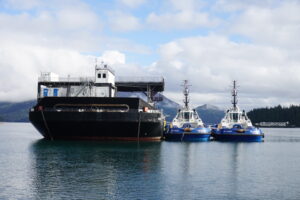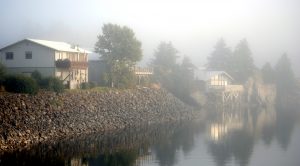
The Council held its fourth annual fishing vessel oil spill response training tour in Whittier, Alaska, on September 25, 2018. The Whittier community was invited to join the council from 11:30 to 1:30 p.m., on a Stan Stephens Cruises vessel to observe the training. Over 60 members of the public participated in the event, including 25 students from Whittier Community School.
Whittier student Abi, 16, stated about the event, “It matters because it keeps our oceans clean and helps keep people knowledgeable about how to respond to the spills. I might want to do it when I get old enough.”
The local fishermen participating in the training are contracted by the Ship Escort/Response Vessel System, also known as SERVS, to respond in the event of a Prince William Sound tanker or Valdez Marine Terminal oil spill. SERVS is Alyeska Pipeline Service Company’s oil spill response organization and coordinates annual oil spill response exercises in multiple Southcentral Alaska communities, including Whittier.
